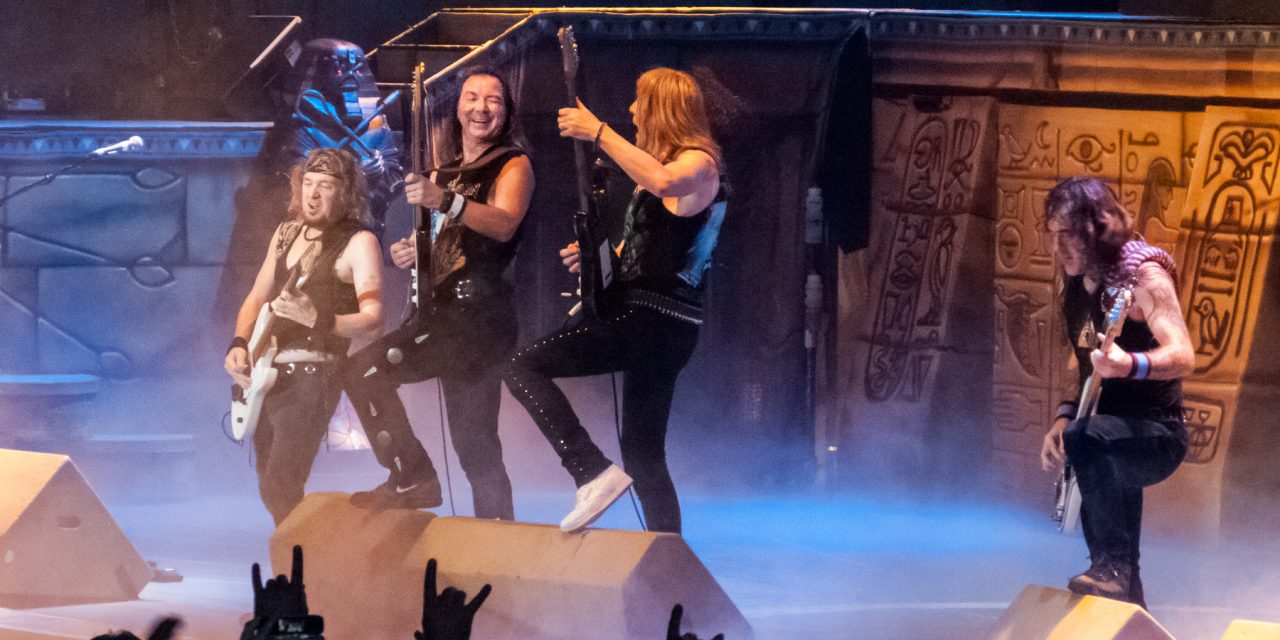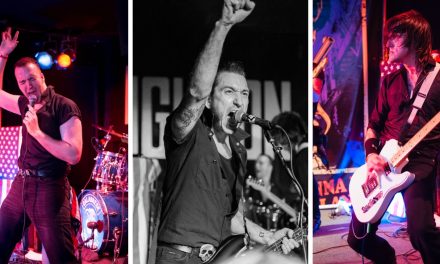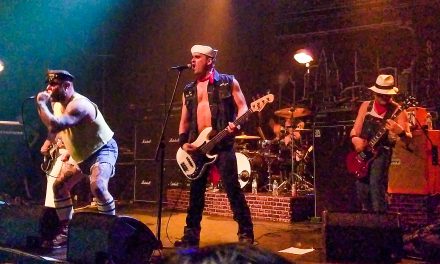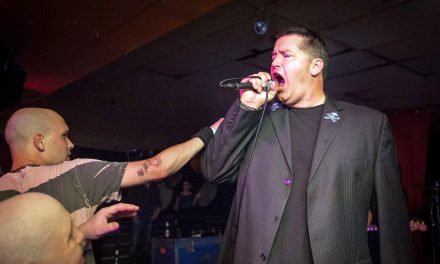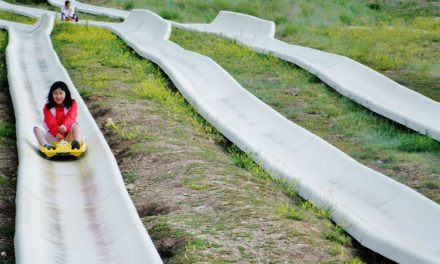Iron Maiden is my favorite band and has always been number one on my bucket list of bands to meet and photograph. As you can imagine, it was next to impossible to get face time with the group when you have a photocopies fanzine with little to no distribution or circulation. But that doesn’t mean I didn’t try.
For years, I harassed the band’s publicist for a phone interview and a photo pass, but I was turned down over and over again. Then something horrible and wonderful happened. In the mid-’90s, Maiden lead singer Bruce Dickinson quit the band and was replaced by the uncharismatic Blaze Bayley. It was a sad time for metal and Maiden slowly started slipping into obscurity. Okay, that might be a little harsh, they were still playing the Roseland Ballroom with Dio, but it was a far cry from packing in arenas.
I figured this might be my only chance to interview the band, so I started hammering the label and PR team for some access. My pestering paid off. A few days before the show, I g0t the green light to do a phone interview with Dave Murray the day before the show. I pushed my luck and told them that my journalistic integrity would be hindered if it wasn’t an in-person interview (I was such a dick). Surprisingly, they agreed.
On the day of the show, I was ushered by the band’s manager to the back of the Roseland where a smiling Dave Murray greeted me as if I was the New York Times. He happily answered all my juvenile questions and never treated me like I was just a dumb fanboy.
After the interview, I turned off the tape and told him how when I was 10, I had a Number of the Beast flag hanging on my wall and my mother freaked out. She told me that I was listening to devil-worshipping music and tore it off my wall. He laughed and told me that it wasn’t the first time he heard that story. After the issue of Life in a Bungalo was published, I sent the interview to Maiden’s management and they asked for my address. A few weeks later, I received a package in the mail from England and inside was a giant Number of the Beast flag with a note from Dave thanking me for the interview.
This interview was originally published in Life In A Bungalo #8 in Winter 1998.
I’ve done plenty of interviews in the last few years, but none star struck me as much as the one you are about to read. Dave Murray and the rest of Iron Maiden have been my heroes since about fifth grade (I’m 20 now), and interviewing him was an experience I will never forget. Iron Maiden are the biggest metal band out of England. Formed in the mid-’70s, the band sought to disassociate themselves as much as possible from the burgeoning punk rock community. Combining powerful music, well thought-out lyrics (drawing from stories of mythological creatures in real historical events) and explosive live sets, Maiden made a name for themselves and helped define ’80s metal music.
While other band spent more time putting on make up than playing concerts, Iron Maiden took their act around the world, selling out arenas everywhere. Even after the death of metal and the loss of their legendary frontman and lead guitarist, Iron Maiden can still put on a hell of a show. The following interview with Dave Murray (guitar player and founding member) was conducted on July 7, 1998 before the band’s show at the Roseland Ballroom and details the Maiden’s present state and plans for the future.
George: How’s the tour going so far?
Dave: It’s going great. We’re doing a world tour with the Virtual XI album. We just finished six weeks in Europe and now we are a week into the American tour. We are going east to west and all points in between. After this, we are going back to Europe and then Asia and Japan. There are a lot of people — a lot of critics out there — that are claiming that rock is dead, but on this tour we have been playing to a lot of people. We’ve had a shows with like 8,000 people and it’s been a really healthy turn out.
George: Have the shows been bigger than the last tour?
Dave: On the last tour, we were testing the waters because the whole metal scene had taken a really big dive. We wanted to tour America but the promoters weren’t interested in doing bigger venues. We went on a club tour — except for LA, New York and Chicago where we played theaters — which was just an introduction of Blaze Bayley to the American public and that went really well. This time around, we felt that we could justify playing bigger venues and we had the belief that if you build it, the fans will come. They did and they have.
George: Have the crowds calmed down over the years?
Dave: Become more refined? More sophisticated? Yeah, but there’s a new generation of fans out there. We get a few fans from the ’80s and they tend to stand in the back, but you get the young kids up in the front. The reaction is the same — they’re really into the music and sing all the lyrics. We have a special interaction between the band and the audience. You can put us in a small club — you can put us in a stadium — and we’re still going to enjoy ourselves. You have to get that across to the audience so they’re out there responding to that with their fists in the air and just let go. The music moves you, and you can absorb it and it’s been working really good that way.
George: Do you miss playing the big arena shows?
Dave: We are doing a couple of them on this tour, but it’s basically, “If you can fill them, well then do them.” We prefer playing packed out theaters than playing to half empty arenas. I look back at those times, in the mid-’80s, when the band would play 20,000 seat arenas every night, but that was the peak of our band’s career. To continue, you sometimes have to take a step back to walk forward. However, we still try to make every gig an event — something special.
George: Is there anywhere new your playing this tour that you’ve never played before?
Dave: Actually, Istanbul in Turkey. Every tour we try to go somewhere new. Last tour, we played in Africa, Jerusalem and Tel Aviv. This time it’s Istanbul, and there is a lot of mystique there. We’d like to go to China someday.
George: Were there any new approaches to recording Virtual XI?
Dave: We used a lot of computer technology on this album. With virtual tracks, you can have as many tracks as you’d like to play with. We used that to try to bring the sound of Maiden into the new millennium and to get the album sounding really modern. We laid the drum tracks down, but this time he kept a lot of the original stuff with guitar and bass. Because they felt really good with the track. We used a lot of keyboards and the rest was the same except we have thousands of tracks available. “Eyes of a Stranger” was a big production and songs like “Clansman” incorporated a lot of little things like a track for chimes here and there.
George: Why did you change American record labels?
Dave: We are now part of CMC/BMG in America, but we are still on EMI in the rest of the world. BMG has been a very supportive label for the band and they’ve got a lot of other great bands from Deep Purple to YES to Motorhead. They are very good label and the album is in stores. BMG is much more of a family label and they pay attention to the bands — promote the bands. We’ve got a good relationship and they are a great bunch of guys.
George: Are there any song topics that you would like to cover that you haven’t gotten around too?
Dave: We always try to stretch ourselves and try to push ourselves musically. We may go to Turkey and get inspired there. There still is a lot of ground to cover. We can also go back and try old stuff again. Like the sci-fi stuff or even some political things. You can actually revisit some of that and expand on it. There is a lot of life in those songs. It’s not just getting up on stage, drinking and singing about my baby. That’s all good, but we like to go a little bit deeper. So when the fans read the lyrics, it’s kind of like reading a story. They may actually learn something from it.
George: Is it true that Iron Maiden is working on a video game?
Dave: Have seen the new video we made for “Angel and the Gambler” off Virtual XI — it’s all computer-generated? Well, that’s the preview of our new Iron Maiden video game. In the game, Ed Hunter, you are going to be chasing Eddie throughout time and space, kind of like DOOM, except each of the Iron Maiden albums are going to be three-dimensional levels. Take an album like Somewhere in Time, and you’re running after Eddie in a futuristic world with all these space age cars. With Powerslave, you’re going back to Egyptian times and there will be pyramids everywhere and a ton of sand. The first level, you’re running through the back alleys and subways of England chasing after Eddie and follow him through each level until you get to Virtual XI. I gather there is one level where you will have to put 3D glasses on the play. There is also going to be instrumental Maiden music throughout the game, and will tie the level in with that particular album. Check it out on PC and Playstation. (Editor’s note: Ed Hunter eventually came out in 1999 as a bonus disc on the greatest hits of the same name. The tour to support the album was the first with Dickinson and Adrian Smith back in the fold.)
George: Are there any bands that you’d like play with?
Dave: We have toured with a lot of great bands that we really respect. We just went and saw Page and Plant the other night, in Cleveland, and it was incredible. Touring with them would be great, but that would never happen. I’d like to tour with them just because I get to hear the greatest rock songs from the greatest rock band every single night. Who else? Maybe someone like Deep Purple, YES, Eric Clapton. Mostly shows that would never happen. We have to be content going down and just watching them.
George: Is there anything you still want to accomplish?
Dave: If it were all to end tomorrow, I would feel very satisfied with everything I’ve accomplished personally, I’ve been very happy and it’s been a very rewarding career. So if I were to die tomorrow, I’d just go, “Hey, it’s been brilliant.” When you make an album and you go on tour with it and you take a year off — you have time to recharge and everything becomes fresh and new again. There is always more to do. We’ve got more ground to cover but the main thing is the fans. As long as they are buying the albums and coming to the gigs, we are going to keep on rolling. And as long as the fans are still around, we will keep doing what we love doing.
George: How do you feel about bands from your time, that are still around today but have completely changed their style?
Dave: There are a lot of bands still around — Sabbath, Emerson Lake and Palmer, YES — all those guys are still out there doing their thing and they are doing it for the love of it. I don’t think it’s a monetary thing. There is this adrenaline rush that comes from going onstage in front of all those people. It something that boxers can relate to. George Foreman is in his 50s and he is still fighting. It’s the whole build up of going out there and playing in front of adoring fans. It’s an intangible feeling.
George: What about bands who have done a complete 180, like Metallica and Guns ‘N’ Roses?
Dave: It’s up to the individual. They have reinvented themselves and are into something completely different and good luck to them. I think every band has their own way of doing things, but with Maiden, you know what to expect. There is this deep-rooted style that has been written in concrete and carved into stone. Fans know the identity of the band and they know what they’re going to get. Bands that change their sound drastically still draw the crowds, so maybe it takes the fans a little bit of time to get their heads around the new music. Kind of like the Monty Python saying, “And now for something completely different.”
George: Are there any new bands that you are enjoying?
Dave: There’s a band called Massive Attack that I really like.
George: Tricky used to be with them.
Dave: Yeah. I really like those guys. They have this video called “Teardrop” that is excellent. Every few years, there is going to be a new type of sound coming in. I’ve experienced the acid hippie stuff in the ’60s, the pop rock bands of the ’70s and, of course, the glamour of the ’80s, but that doesn’t affect us, because we have a certain kind of audience.
George: I was wondering, in the insert sheet of the new album, there are pictures of your soccer team. But the heads don’t seem to match the bodies. Where those pictures real?
Dave: The bodies are real but the pictures were taken individually. The computer graphics were laid out on a green background, but all the bodies are real. Except there is one shot of me that isn’t my body, but it is my head, because I never made it to the photo shoot.
George: Is that really your team?
Dave: No, that football team, and all the players, are professional players. They were approached with the concept and thought it was a good idea. It would have been virtually impossible to get all those guys together. So they went to the studio and had their individual photos taken. They were computer manipulated so that some of the faces were changed to protect the innocent.
George: Are you still friends with any of the other bands from the ’80s?
Dave: Sure, I play football with Joe Elliot. Bands like KISS, we still see on the road. However, they are acquaintances than friends, but we still have a lot in common with all those bands.
George: Is this Iron Maiden’s final incarnation? Is this the permanent line up?
Dave: Yeah, I think this is definitely it. There won’t be any more changes. If there is, we will probably be taken off to the funny farm.
(Editor’s note: Six months after this interview took place, Iron Maiden dropped Bayley, reunited with Dickinson and Smith and proceeded to once again become the biggest metal band in the world, selling out arenas and stadiums to this day. I would like to take full credit for this. I was also never granted another Iron Maiden interview or photo pass.)

